The Hidden Cost of AI Writing: Why Your Best Ideas Come from the Struggle
New MIT research reveals AI writing tools create 'cognitive debt' - weakening memory and original thinking. Learn how entrepreneurs can use AI strategically without losing their competitive edge. Includes practical frameworks for brain-first thinking.
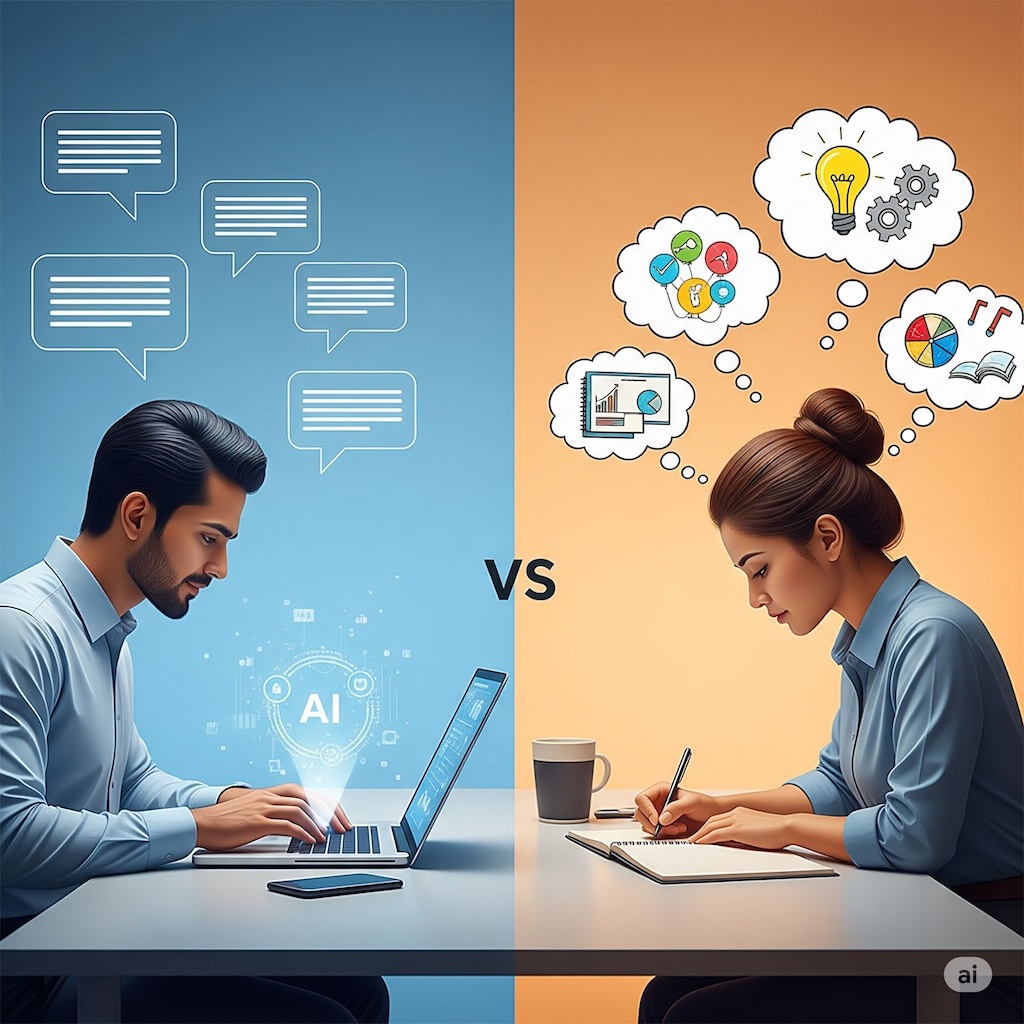
Summary
I've been watching entrepreneurs and business builders rush to adopt AI writing tools, and while I'm genuinely excited about AI's potential, some recent research has me thinking we might be missing something crucial. A fascinating study involving 54 participants from Boston universities reveals that relying on AI for writing creates what researchers call "cognitive debt" - short-term convenience that costs us long-term thinking ability. For resourceful entrepreneurs, this matters because our competitive edge often comes from being outliers, not optimizer.
Key Points
- AI tools are incredible for refinement and editing, but starting with AI robs us of the messy, valuable process of developing our own ideas
- When we outsource thinking too early, we lose the ability to build unique mental models that drive innovation
- The research shows measurably weaker neural connectivity and memory in people who write with AI versus those who think first, then refine
- Our "inefficient" human thinking process is actually what creates breakthrough insights that AI's statistical optimization misses
Key Takeaways
- Use AI as an excellent editor after you've done the hard work of thinking and creating your first draft
- Protect your cognitive capacity by tackling complex problems without AI assistance initially
- Remember that being an outlier in thinking often leads to the innovations that reshape entire industries
- Balance AI efficiency with deep cognitive work to maintain your competitive advantage as an entrepreneur
Last month, my friend shared his business proposal developed entirely with ChatGPT/Claude. The result? Polished, professional, and maybe forgettable. When I started to discuss various aspects of his business, he struggled.
The AI had done such a good job optimizing his proposal that he did not make time to understand it in detail and make changes to add his unique perspective
This got me thinking about something I've been noticing across the entrepreneurial community. Everyone is rushing to adopt AI because they're genuinely amazing - they can handle the nitty-gritty stuff I dread such as:
- Fix the grammar
- Make our ideas sound professional
- Structure it better
- Avoid being too verbose
But are we paying a hidden price?
Recent research from MIT and other Boston universities suggests we might be. The study tracked 54 participants writing essays with different approaches:
- One group used GPT-4
- One group used Google search
- The Final third group relied only on their brains.
The findings reveal something that should concern anyone and everyone, who has started outsourcing their thinking to AI (including myself on many occasions).
The Cognitive Debt Problem
The researchers coined the term "cognitive debt" to describe what happens when we repeatedly outsource mental effort to AI. Think of it like financial debt - you get immediate relief, but the long-term costs compound.
Here's what they found:
- Participants who wrote with AI assistance showed significantly weaker neural connectivity compared to those who worked without digital tools.
- When asked to quote from essays they'd just written, 83% of the AI group failed compared to only 11% of the brain-only group.
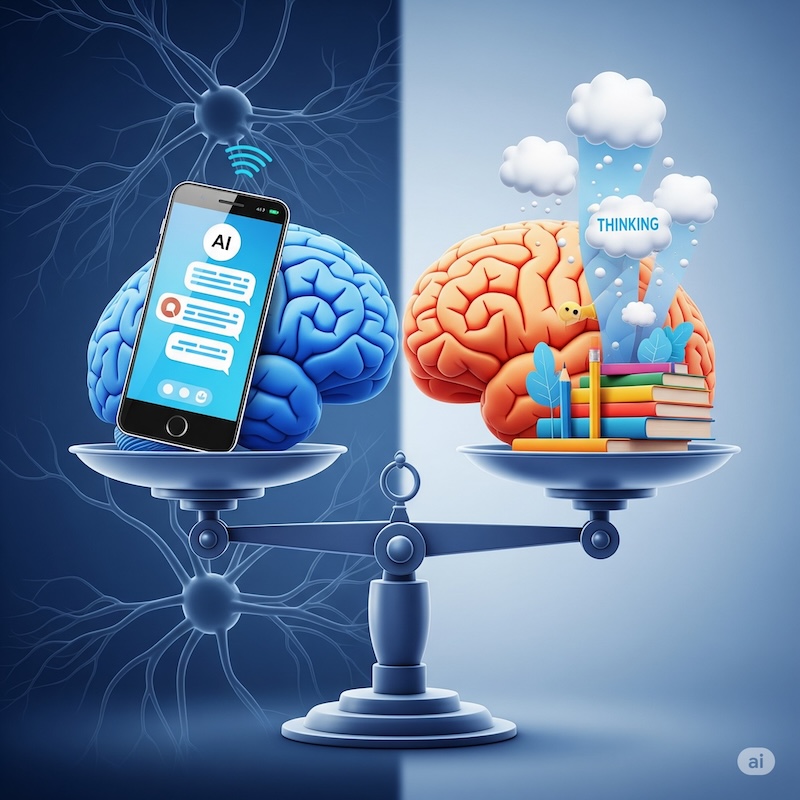
As one participant put it:
I think this essay without ChatGPT is written better than the one with ChatGPT... in terms of detail, the essay from Session 4 is better for me.
For entrepreneurs, this hits differently than it might for students. We're not just writing essays - we're developing the strategic thinking that will drive our businesses. When we outsource that thinking too early, we risk losing what makes us competitive: our unique perspective.
Why Human "Inefficiency" Drives Innovation
When we research on any topic the old-fashioned way
- Digging through articles
- Following tangents
- Developing our understanding piece by piece
- we develop mental models that are uniquely ours.
AI, being a statistical model optimized for the "best" response, naturally pushes us toward conventional thinking. But here's the thing about entrepreneurship: most breakthrough ideas looked crazy at first.
The research backs this up - essays written without AI assistance showed significantly more originality and diversity than those created with AI help.
The study found that human teachers described AI-assisted essays as "soulless," noting they "lacked personal nuances" despite being technically polished.
An AI judge scored these same essays highly on metrics like structure and language, but humans valued "individuality and creativity over objective 'perfection'."
This reminds me of every successful business I know.
- Airbnb seemed insane - who would stay in strangers' homes?
- Uber faced massive regulatory resistance.
- Why would we order something online that we have not seen yet
These outlier ideas succeeded precisely because they weren't optimized for conventional thinking.
The Strategic Use AI As Editor, Not Author
Don't get me wrong - AI is incredibly powerful when used strategically. I use it regularly, but lately, I have using a similar approach as detailed in "Brain-to-LLM" approach in the research paper
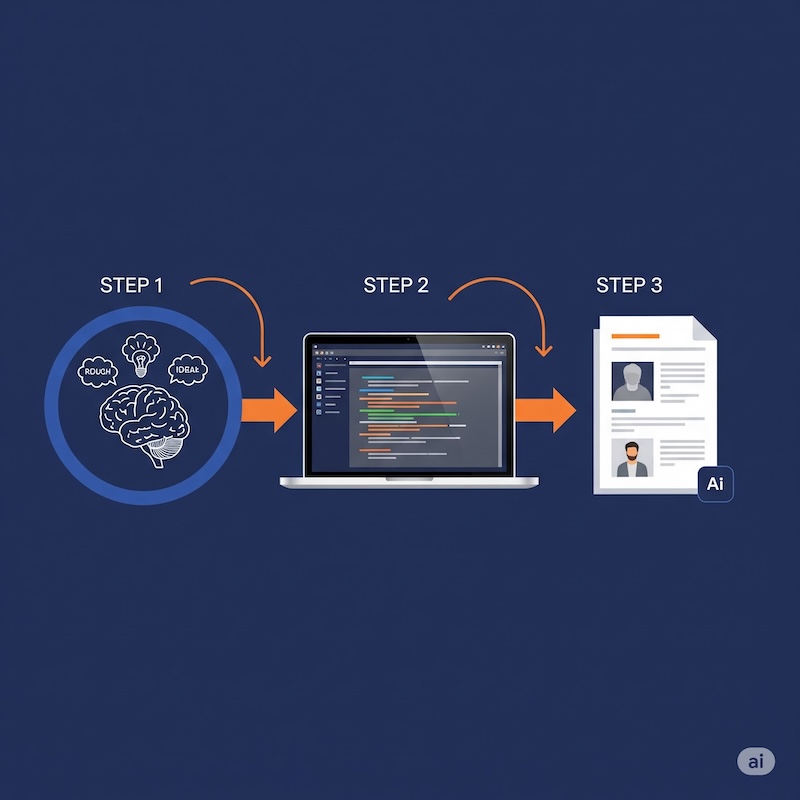
Here's how it works in practice:
Step 1: Think First
When I'm working on my business, or writing blog posts, or business plans, I start with a blank document and my own brain. I think about what my goal is and think through to develop my goals, refer to my notes or internet or even AI to build connections with my ideas. The goal is to develop my argument organically. While it appears inefficient in the AI age but I strongly feel that this is where the true value is created.
Step 2: AI as Editor
Once I have my core ideas down, AI becomes my excellent editor. It helps me:
- Tighten word counts
- Improve clarity and structure
- Catch grammatical errors
- Suggest better transitions
Over time I have developed custom AI prompts that help me in this. The goal is to nudge AI to develop a voice that resembles me as far as possible.
Step 3: Reclaim Ownership
Once AI creates anything, I take time to read it in full to ensure my voice and insights are not diluted. If something sounds too polished or generic, I try to find more info on it or dial it back.
Even the research paper supports this approach. Participants who started with brain-only work and then used AI showed increased neural engagement and better integration of ideas. As the study noted: "Brain-to-LLM participants, encountering the LLM, needed to integrate its suggestions with existing knowledge, engaging multiple networks."
The Three-Question Framework for AI Use
Before using AI for any thinking work, I ask myself:
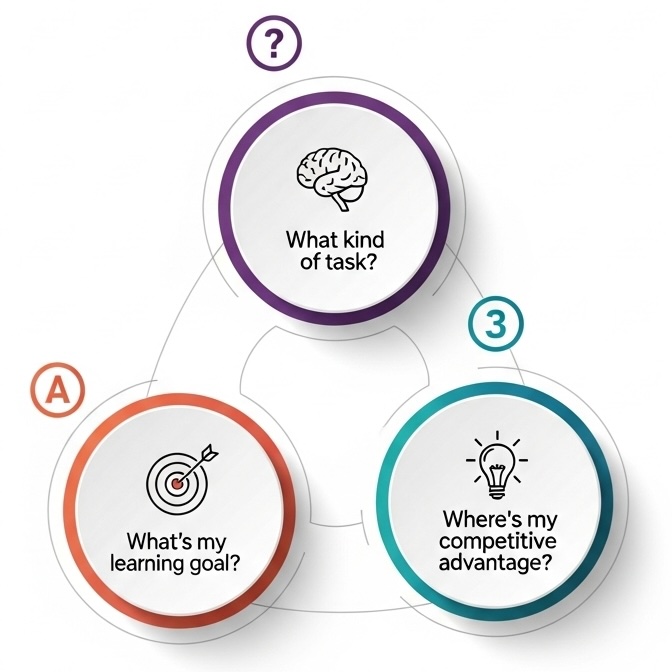
1. What kind of task is this?
- Creative/strategic thinking: Start with brain-only work
- Editing/refinement: AI can be helpful
- Routine formatting: AI is perfect
2. What's my learning goal?
- Building expertise: Do the hard work myself first
- Improving efficiency: AI can help after I understand the fundamentals
- Quick output: Let AI do it as long as I have understood the core ideas and arguments
3. Where's my competitive advantage?
- Unique insights: Protect this from AI optimization
- Industry knowledge: Build this through struggle, not shortcuts
- Implementation: AI can help with execution
The Outlier Advantage
An interesting finding from the research wasn't about writing quality - it was about homogenization. The AI-assisted group produced remarkably similar content, using similar named entities and following similar writing structures. They were all optimized towards the same statistical mean.
However, business success often comes from being an outlier, not doing what has been done already. Now if everyone uses the same AI tools to think about a problems, we will end up with similar solutions. The competitive advantage goes to those who can think differently, not just implement efficiently.
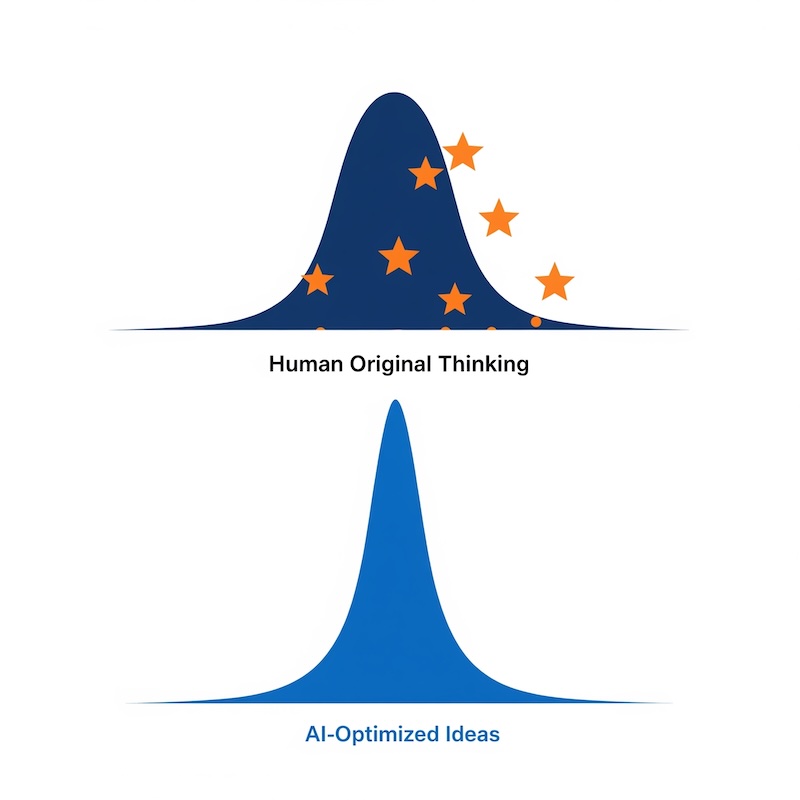
I've seen this play out repeatedly even before the dawn of AI era. Many entrepreneurs, who are building truly innovative companies are often described as being wrong by many, with only a few sharing insights to improve it.
Peter Theil argues in the book "Zero To one" to develop contrarian insights through deep, independent thinking - something that becomes harder when we rely too heavily on AI from the start.
Balancing Efficiency and Depth
I'm not advocating against AI tools - they're genuinely transformative. I use them on a regular basis to get lot of my work but lately, I have become more intentional about when and how I use them.
Even the research showed that people who switched from AI-assisted work to brain-only work struggled significantly. Their neural networks for independent thinking had weakened. As one researcher noted:
The LLM-to-Brain group's early dependence on LLM tools appeared to have impaired long-term semantic retention and contextual memory.
Though it was a small study and not even time has passed to arrive at a more far-reaching conclusions, it is something to be wary about
For entrepreneurs, this suggests a practice I've started following lately:
- Spending time with a notebook and a pen to think through my business problems
- Build initial ideas and hypothesis based on personal experiences and online search without AI assistance,
Consider it as a way to ensure that our brains retain the edge and capability even when AI can do a better job than us
Practical Implementation
Here's what this looks like in my daily work:
Morning Coffee Sessions
I start my day with a notebook or notes app on my iPad while sipping coffee. I focus on thinking on ideas or articulating my thoughts on whats in my head
Research Deep Dives
When exploring new markets or technologies, I start with primary sources and my own analysis before asking AI. Once I get some basic idea, I undertake a Gemini Deep Research on the topic but explain clearly on what I know and what is needed further. Lately I avoid giving AI complete control when it does deep research as it feels too generic.
Draft-First Writing
All substantial content starts as a messy first draft from my brain. AI helps polish, never creates anything from scratch.
Problem-Solving
I give myself time to struggle with complex business challenges before seeking AI assistance.
The goal isn't to avoid AI - it's to ensure I'm building on a foundation of independent thinking rather than statistical optimization.
The Long-Term View
While its still early in our understanding of AI's impact on human cognition. This study involved only 54 people over four months, so we should avoid drawing sweeping conclusions. Humans are remarkably adaptable, and over time new ways to to maintain cognitive strength while leveraging AI effectively will be developed.
However, early signals do suggest that we need to be bit more thoughtful. As the researchers put it:
Cognitive debt defers mental effort in the short term but results in long-term costs, such as diminished critical inquiry, increased vulnerability to manipulation, decreased creativity.
For entrepreneurs, these long-term costs could be devastating. Our businesses depend on our ability to see opportunities others miss, develop unique solutions, and adapt to unexpected challenges. If we outsource too much of our thinking, we risk losing what makes us valuable.
Moving Forward
The answer isn't to reject AI tools - that would be like refusing to use calculators because we might forget add or subtract numbers. Instead, we need to be strategic about maintaining our cognitive capabilities while leveraging AI's strengths. For Ex: It would make complete sense to use calculators for every arithmetic once we have learnt how to add or subtract or multiple or divide numbers without using calculators
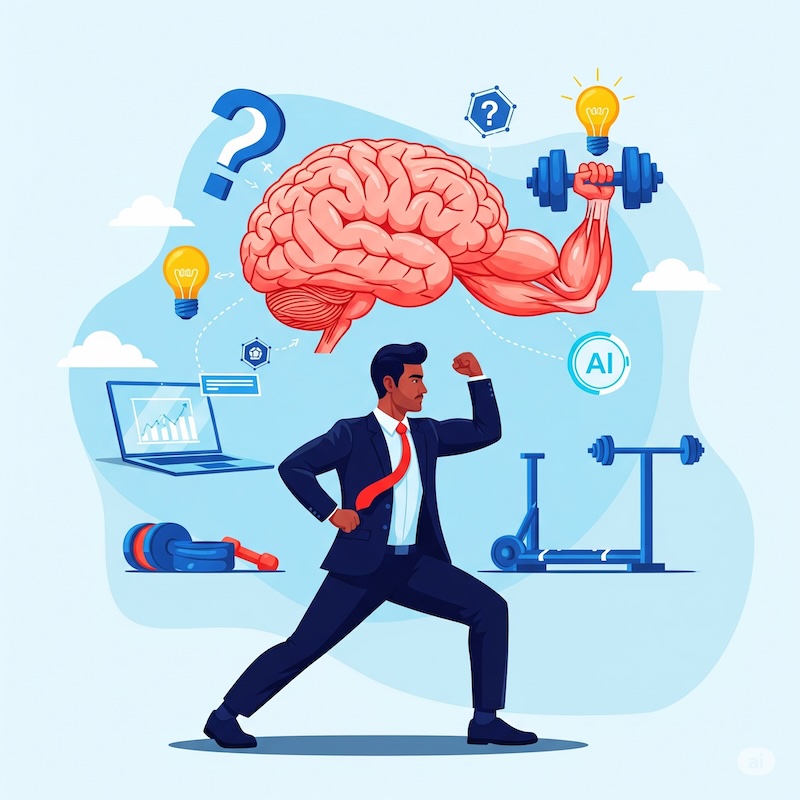
Consider it as how we use machines and tools to make our workouts more efficient, but you still need to do the work to improve our physical fitness. AI can make our thinking more efficient, but we still need to do the work of building cognitive strength.
I am of the strong opinion that entrepreneurs who will actually thrive in the AI age won't be those who will be optimizing everything through AI. They'll be those who maintain their ability to think independently, develop unique insights, and then use AI strategically to execute more effectively.
As one participant in the study reflected:
I would rather use the Internet over ChatGPT as I can read other people's ideas on this topic.
There's wisdom in that preference - exposing ourselves to diverse thinking, accepting real world complexity will actually help us develop our own mental models.
AI is an incredible tool. Let's make sure we remain incredible thinkers.
FAQ
Doesn't this research have limitations given the small sample size and short duration?
Absolutely - 54 participants over four months is a limited dataset, and we should be cautious about drawing broad conclusions. Humans are incredibly adaptable, and we may develop new strategies as we gain more experience with AI tools.
However, the neurological and behavioral patterns observed are consistent enough to warrant attention, especially since the costs of over-reliance will only compound with passage of time.
Aren't you just falling into confirmation bias by supporting research that aligns with your views?
That's a fair challenge, and I try to stay aware of this tendency. The research does align with my observations, but I also acknowledge AI provides genuine benefits:
- Better writing clarity
- Faster iteration
- Access to information I might miss.
My argument isn't against AI but for strategic use that preserves the cognitive capabilities that drive innovation.
How do you balance AI efficiency with the time costs of "brain-only" work?
I prioritize based on strategic value. For routine tasks such as formatting or basic editing, use AI immediately. For core business strategy, content creation, or problem-solving that will actually define your competitive advantage, invest the time in independent thinking first. Think of it like deciding when to cook versus ordering takeout - both have their place. If we always order food, we might end up being hungry when all restaurants are closed due to a strike
What about entrepreneurs who lack strong writing skills naturally?
This is where AI can be genuinely helpful, but I'd still recommend the "brain-to-AI" approach. Start by getting your ideas down in whatever way works - voice notes, bullet points, rough drafts. Then use AI to help structure and polish. The key is ensuring your unique insights and perspective drive the process, even if AI helps with execution.
How can someone tell if they're becoming too dependent on AI for thinking?
Try the "quote test" from the research - after writing something with AI assistance, can you accurately recall and explain your key points without looking? Also notice if you find yourself reaching for AI tools before you've even attempted to think through a problem independently. Both could signal over-reliance.
What specific practices help maintain cognitive strength while using AI?
Regular "cognitive weight training" - deliberately tackling complex problems without AI assistance. I also practice active recall after using AI tools, challenge AI suggestions rather than accepting them automatically, and maintain diverse information sources beyond AI-curated content. The goal is keeping your thinking muscles strong while leveraging AI for execution.